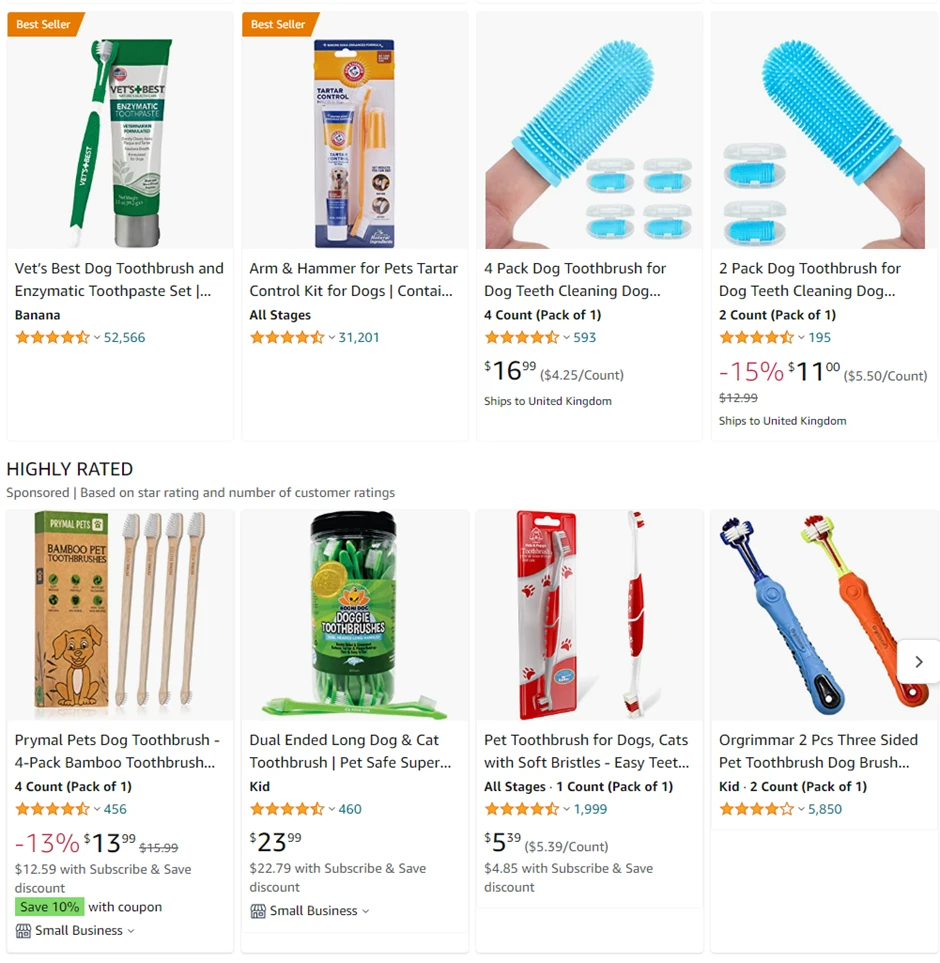May 13, 2025
Amazon Private Label vs Arbitrage in 2023

The very first question for most people starting their Amazon selling journey in 2023 is which business model to go for – private label vs arbitrage? Let’s go over the differences between them, who is suited to each model, and which one will make you more money in 2023!
What is Amazon Private Label?
Private labeling is a simple business concept where you buy products from a manufacturer and sell them under your own brand.
You can private label almost any product, from cheap disposable gloves to expensive electronics, but on Amazon, we typically refer to everyday products when we’re talking about creating a private label business.
A few random examples would be a dog toothbrush or massage gun.

There’s a lot more to an Amazon private label business than just slapping your own logo onto the product, but that’s the basic idea of the business model.
Just so it’s clear, buying generic unbranded products and reselling them is NOT a private label. In fact, by doing that, you miss out on the key point of an Amazon private label business, which is customizing and improving the product and then creating a brand behind it!
Without these steps, I can almost guarantee that you won’t create a successful Amazon business. If you’re simply selling a commodity you will have to compete against 100s of Chinese sellers with direct access to factories and much better pricing than you can hope to get.
So don’t cut corners here!
What is arbitrage selling / flipping?
Flipping, or arbitrage selling as it’s more formally known, is when you buy products from retailers such as Walmart or TJ Maxx and resell them on Amazon.
Opposite to private label, with flipping you’re selling products from big brands that everyone already knows instead of designing, developing and sourcing products on your own. These items can either be purchased online (online arbitrage) or in retail stores (retail arbitrage). An example would be this popular toy which was all the rage in recent months:

Now that we know what they are, let’s go over some of the pros and cons of the different business models.
Advantages of creating an Amazon private label business
Let’s summarize the key advantages you gain by creating an Amazon private label business.
Scalability and Potential
With an Amazon private label business the potential is truly unlimited! Anker, an Amazon FBA brand, sold almost $2 billion dollars in 2021.
Amazon US, Amazon CA, Amazon UK, Walmart, Shopify, Retail stores – you can scale your business as far as you want when it comes to private label. This just isn’t the case with flipping where you have much less control (after all you’re selling products from other brands) and it’s a lot harder to scale.
Say I find an amazing clearance buy at my local Walmart – a top-selling board game for $5 (70% off) which I know will sell on Amazon for more than twice what I paid, leaving me with an easy 100% return on investment after FBA and Amazon referral fees.
Amazing! Nobody is going to say no to doubling their money. So can I spend $5,000 or $10,000 on stock of this product? Well no, because you can only buy as many sets as Walmart have on offer. That could be 10, 20, or even 1…
This is the big limitation of flipping vs private label. And the limited scalability also means limited potential.
Building a Sellable Asset
With an Amazon private label business you’re in control. You’re creating a brand and business that has real value and can be sold.
That might not be part of your plans – instead you may want to ride the Amazon gravy train for years to come and hand it down to your kids and grandkids. But maybe you want to sell for $10 million within 3 years and retire to some sandy beach to enjoy life.
Whatever your plans are, with an Amazon private label business you have the choice. The same can’t be said for flipping as no matter how many processes and systems you put in place, it’s not a sellable business.
Time
Another big benefit of private label vs arbitrage is how little time you need to spend on your business once it’s off to a running start.
Anyone who tells you that you can launch and grow your Amazon FBA business working one hour a week is a liar (and is probably trying to sell your something) and to start off there is a lot of work you need to do.
But once you’ve established your product and brand the only weekly tasks you have to take care of are:
-
Maintaining inventory levels (ordering stock, sending shipments to Amazon)
-
Maintaining PPC campaigns (monitoring and optimising keywords and bids)
With FBA Amazon are the ones who do most of the work, such as storing and shipping orders, dealing with customer service, returns and payments.
With flipping you do still get all these same luxuries if you’re using FBA, but the problem is that the product sourcing takes up a huge chunk of time in itself.
Advantages of creating an Amazon flipping business
Now let’s switch over to the advantage of arbitrage and flipping.
Start-Up Capital
Don’t believe the Tiktok Amazon gurus saying you can start a private label business for $200. As we showed in this guide, $5,000 is a much more realistic figure, and even then you’re limited on what products and niches you can go for.
With flipping on the other hand you can start with any amount and build your business from there. If you only have $100 to start? That’s fine! Buy two products for $50 and flip them into $150 and rinse and repeat.
Low start up capital also means low risk and this is definitely one area where flipping trumps private label.
Immediate Return on your Investment
Creating a private label business on Amazon means your capital is tied up for a lengthy period of time. You normally have to pay 50% upfront to your manufacturer, then production can take weeks or even months, nevermind the time it takes to ship the products to you and then onto Amazon.
All in all it’s a long process and you’re looking at months before you get any return on your initial investment.
But with flipping the opposite can be true. Yes, when you sell via Amazon then your money will be held for a while after you’ve made the sale but if you sell on Facebook Marketplace or locally then you can make a profit within hours of buying a product to resell!
Yes if you sell via Amazon your money will be held for a few weeks but if you sell locally on Gumtree or Facebook marketplace for example you can buy and sell a product within days or even hours! That way you get an immediate return on your investment and can keep compounding.
Conclusion: Private Label on Amazon is Unbeatable
So, which model wins the ultimate Amazon private label vs arbitrage duel?
Overall, flipping is a great business model, especially if you don’t have the capital or experience to create a private label business. But there are some serious drawbacks to it if you want to grow a real, sellable business on Amazon.
In comparison, I think the private label is the perfect business model and the best opportunity to make big money online in 2022. Considering its potential vs risk, nothing else can compete.
Shopkeeper helps both private label and arbitrage sellers
Regardless of your strategy, you will need a tool that helps you track your financials. There are many key challenges sellers face in keeping track of their profitability:
-
navigating the many different fees Amazon charges, sorting through all of the different reporting options,
-
matching sales on Amazon with costs that you are sourcing outside the Amazon ecosystem,
-
keeping track of changes in fees and prices – and that’s just to name a few.
Shopkeeper’s easy-to-use Amazon seller software brings all of the information you need above into one simple interface so you get real-time access to all of your data with one click. This saves you massive amounts of time and will help you minimize costs and maximize profits as you track changes.



